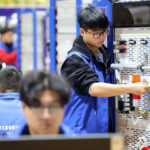This year marks the 30th anniversary of China’s participation in the Asia-Pacific Economic Cooperation (APEC).
Over the past 30 years, China’s economic development has been an integral part of the Asia-Pacific cooperation process, and the country’s visions and actions have been playing an increasingly important role in promoting regional open cooperation.
Chinese President Xi Jinping Thursday delivered a keynote speech at the APEC CEO Summit via video link in Beijing. He stressed that it is important that countries and regions in the Asia-Pacific face up to the responsibility of the times, be in the driver’s seat, and strive hard to meet the goal of building an Asia-Pacific community with a shared future.
What he said has charted the course and boosted confidence for the region to tide over difficulties and jointly make a better future.
At present, COVID-19 is still ravaging the world, and the journey to global economic recovery remains a difficult and tortuous one. The Asia-Pacific region shall and can overcome difficulties and lead global recovery. APEC members make up over 60 percent of the global economy, and their trade volume accounts for more than half of the world’s total. The Asia-Pacific has all along been an important engine driving the global economy. Indeed, it is among the first to regain the momentum of recovery in this crisis.
Last year, APEC economies adopted the APEC Putrajaya Vision 2040 and set themselves the goal of an open, dynamic, resilient and peaceful Asia-Pacific community, charting the course for economic cooperation in the Asia-Pacific. This time, Xi noted that the Asia-Pacific needs to make all-out efforts to fight COVID-19, uphold openness and cooperation, promote green transition, and actively promote innovation, which has made clear the priorities of today’s Asia-Pacific cooperation, and will help APEC members enhance solidarity and cooperation to jointly mitigate the impacts from COVID-19, reinforce the engine for economic development, and drive global recovery.
The APEC has advanced trade and investment liberalization and facilitation in tandem with economic and technical cooperation, and advocated open regionalism, playing an important role in improving regional economic integration. In the past decades, the Asia-Pacific has weathered two financial crises, and lifted over one billion people out of poverty. It has become a leading and most dynamic powerhouse of the global economy.
The successful experience in the past shall shed a light on the future. With major changes and a global pandemic unseen in a century, the Asia-Pacific cooperation must progress with human history and keep pace with the trend of times in order to make the right choice at the important period of history.
All parties concerned shall be broad-minded, follow the underlying trend of the times and proactively expand opening-up. They should advance trade and investment liberalization and facilitation, keep industrial and supply chains stable and functioning, and promote the orderly flow of resources and inputs to boost economic recovery and achieve interconnected development.
They should be forward-looking, move ahead and reject practices of discrimination and exclusion of others.
Attempts to draw ideological lines or form small circles on geopolitical grounds are bound to fail. The Asia-Pacific region cannot and should not relapse into the confrontation and division of the Cold War era. It is important for the region to stay committed to the shared goal of common development, address differences through consultation and explore solutions to common challenges in the spirit of partnership.
China has always been a staunch promoter of Asia-Pacific cooperation, and is constantly creating opportunities for the region with its own development. The 22th APEC Economic Leaders’ Meeting held in Beijing seven years ago laid out the direction and targets for Asia-Pacific cooperation, made an important decision to start and advance the process of the Free Trade Area of the Asia-Pacific, and adopted a blueprint on APEC connectivity, becoming an important milestone for Asia-Pacific cooperation.
China has taken the lead to ratify the Regional Comprehensive Economic Partnership (RCEP), and applied for joining the Comprehensive and Progressive Agreement for Trans-Pacific Partnership (CPTPP), which demonstrated the country’s firm determination to support free trade. At the just-concluded 4th China International Import Expo, a total of $70.72 billion worth of tentative deals were reached for one-year purchases of goods and services. The event further presented the huge opportunity brought by China’s opening-up and development to global enterprises, including those in the Asia-Pacific.
China will remain firm in advancing reform and opening-up so as to add impetus to economic development in the Asia-Pacific, advance green transition on all fronts and make its due contribution to boosting ecological conservation in the Asia-Pacific and beyond, and stay committed to promoting win-win cooperation and contribute to the economic development of the Asia-Pacific.



